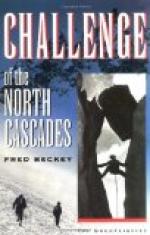“Hello, John,” Orcutt greeted, lifting his Stetson in acknowledgment of the presence of Jean. “Well, what do you think of it?”
McNabb continued to stare about him. “I don’t seem to quite get the straight of it,” he said slowly. “Eureka Paper Company,” he read the legend emblazoned upon the trucks and tarpaulins scattered all over the foreground. “What does it mean, Orcutt? An’ what in the devil are you doin’ here? An’ what business have those trucks got on my tote-road?”
Orcutt laughed, a nasty, gloating laugh, as he rubbed his hands together after the manner of one performing an ablution. “It means, John,” he answered, in a voice of oily softness, “that at last I have caught you napping. The Eureka Paper Company is my company, and the pulp-wood that you held options on is my pulp-wood. I’ve been waiting a long time for this day—more than twenty years. It’s only fair to give the devil his due, John—you’ve been shrewd. Time and again I almost had you, but you always managed somehow to elude me. There have been times when I could have murdered you, gladly. It wouldn’t have been so bad if you had gloated openly when you put one over on me, but your devilish way of apparently ignoring the fact—of acting as though outwitting me were too trifling an occurrence to even notice, at times has nearly driven me crazy—that, and that damned secret laughter I see in your eyes when we meet. Oh, I’ve waited a long time for my day—but now my day has come! And to think how nearly I missed it! I go back in an hour on the same train that brought you in.”
McNabb had listened in silence to the tirade. “But I—I don’t understand it. My options——”
“Your options,” interrupted Orcutt, and his voice rasped harsh, “expired at noon on the first day of July. At one minute past twelve on that day, the property passed into the hands of the Eureka Paper Company of which I am president. I signed the contract and paid over the money myself at Gods Lake Post.”
“Was it July?” mumbled McNabb, apparently dazed. “But—there was Wentworth. He had the papers. Surely he must have known.”
Orcutt laughed. “Yes. Wentworth knew. He knew the day you hired him. And he knew that you thought you had until the first of August. It was Wentworth that tipped the deal off to me.”
“But—why should he have double-crossed me?”
“Mere matter of business,” replied Orcutt. “Figure it out for yourself. If he stayed with you the best he could expect would be a fair salary. With us he was in position to dictate his own terms. They were stiff terms, too, for Wentworth is shrewd. But he has been worth all he cost. He is now secretary of the Eureka, and a very considerable stockholder.”
McNabb was silent for what seemed a long time. When at length he spoke, it was in a voice that sounded dull and tired. “But, Orcutt, the tote-road is mine. I built it. It cost me a hundred thousand dollars—that road did. If you hold the property the road is no good to me, and it is valuable to you. Will you buy it?”




